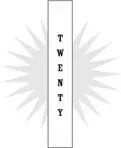Brown’s idea was to make logical forms speakable. Then he could test whether this had a Whorfian effect on people who learned it. Would speaking in logic make people more logical? Would it facilitate thought? Of course logical forms already were speakable in the sense that you could give a long-winded paraphrase like “For every x , if x is a dog, then x is blue.” But in Loglan the translation would be compact and independent of the grammar of English (or any other language).

“All dogs are blue.”
Brown’s article generated a great deal of excitement in the Scientific American audience. He received hundreds of letters asking for more information.
Brown was not the only one in the late 1950s working with the idea that the apparatus of formal logic could serve as a language. A Dutch mathematician named Hans Freudenthal sought to apply the idea to the problem of finding an adequate means for communicating with beings in outer space. In his 1960 book, Lincos: Design of a Language for Cosmic Intercourse , he proposed sending out, by means of varying radio wavelengths, messages that would begin with very simple statements of arithmetic and slowly introduce more and more complex types of statements in a way that would lead the space beings, one logical step at a time, to figure out how the Lincos symbols were related to meaning. They would start by deducing from examples that “>” represented “greater than” and progress to recognizing that this:


represented “whistling for one’s dog.”
Lincos was published by a highly respected international science publisher, and many academics found Freudenthal’s idea interesting, but it never went anywhere. Freudenthal’s dense, technical approach failed to attract a more general audience. A second planned volume was never completed.
The year after Brown published his Scientific American article, he expected to get a raise from the university, but the administration declined to give him one. He was insulted. He had brought scholarly recognition and money (in the form of a small government grant) to his department with his Loglan project, and he expected better treatment. Already bristling under the tension between his progressive politics and the conservative leadership of the university (at that time a Deep South university bracing itself against the growing civil rights movement), he wrote out a list of grievances and submitted it as his resignation. He didn’t need the job anyway. He was making a fortune from the success of a board game he had invented that had been published by Parker Brothers a few years earlier.
The board game was called Careers. Brown, a lifelong socialist, objected to the single-minded focus on money in the game Monopoly. So he developed a game where success is defined not by money alone but by a combination of money, fame, and happiness. The players accumulate points in these three areas by moving around the board, entering different career tracks. They decide before the game what proportion of money, fame, and happiness makes up their personal “success formula.” It does you no good to keep winning money if it is fame or happiness you are after. (Although if you land on the right square, you can buy a yacht to gain happiness points, or a statue of yourself to get fame points.) You win when you have fulfilled your own success formula.
In real life, Brown had spent his first forty years searching for the right track. He was born in 1921, in the Philippines, to Midwestern parents who had moved there to teach. When he was eight, his parents split up, and his mother took him back to the States. He was a bright student with a high IQ, and after serving as a combat navigator in England during the war, he majored and minored in various subjects at the University of Minnesota, including philosophy, mathematics, statistics, and sociology. He wrote a dissertation on “cooperative group formation,” and formed a cooperative community of his own in Indiana, before moving to Mexico to write science fiction. But needing a better way to support his wife and two young children, he moved back to Minneapolis to work at an ad agency, a job he hated, and while he was there, he began working on Careers. His marriage broke up, and after some time in New York (working at the Institute for Motivational Research), and another short, troubled marriage, he found himself in Gainesville with a new wife, an exciting intellectual project, and a steadily growing income that meant he didn’t have to work for anyone anymore. The money Brown earned from Careers allowed him to set up his own Loglan Institute in Gainesville and build a Frank Lloyd Wright–inspired modern home with a separate addition for institute activities. He was free now to devote himself to Loglan and to indulge in his passion for sailing and travel.
In 1962, Brown looked poised to fulfill his success formula and then some.

On a bright October day in 1987, Nora Tansky and Bob LeChevalier married in a small backyard ceremony at their home in Fairfax, Virginia. The soft rustling that accompanied the reading of their vows was not the sound of autumn leaves but the fluttering of sheets of white paper, each one printed with a copy of the vows and distributed among the guests so they would be able to follow along. Bob, a large, heavyset man with a wide smile, went first:
mi prami tu “I love you”
.i mi djica lepo mi kansa tu “I desire the state of being with you”
.i mi cuxna lepo mi speni tu “I choose the state of being married to you”
Nora, petite and shy and unaccustomed to public speaking, was so nervous when it was her turn that she skipped a line without realizing it. After the ceremony, one of the guests, a student who had been taking the Loglan class that Bob and Nora held at their home, pointed out her mistake, and someone caught a photo of her reacting to the news with an embarrassed, happy laugh.
Loglan had brought Bob and Nora together. Nora was one of the few women who ordered a copy of Brown’s Loglan book (which he finally published in 1975) after she saw an ad for it in Scientific American . A computer programmer who had enjoyed studying foreign languages in school, she had been working with her brother on making up her own invented language when she discovered Loglan and, deciding she liked the clarity of expression it offered, put her own project aside. She also ordered a subscription to the Loglanist , a journal edited by a philosophy professor in St. Louis, and was soon actively involved in the development of the language.
The Loglanist was a place where the correspondents that Brown had attracted could propose new words, hash out problems that came up in trying to use the language, and, as Brown particularly encouraged, build up a corpus of examples “to which the hungry learner of the language can sit down for his nightly repast.” These Loglan texts, submitted by subscribers and vetted for accuracy by Brown himself, could be translations, such as the biblical story of Babel, of which the first line retranslates as “And point-all of the Earth was languaged by one something x and talked x ” (And the whole earth was of one language and of one speech). Or they might be original compositions, such as this little dialogue about a tourist’s visit to “Loglandia”:
Читать дальше
















